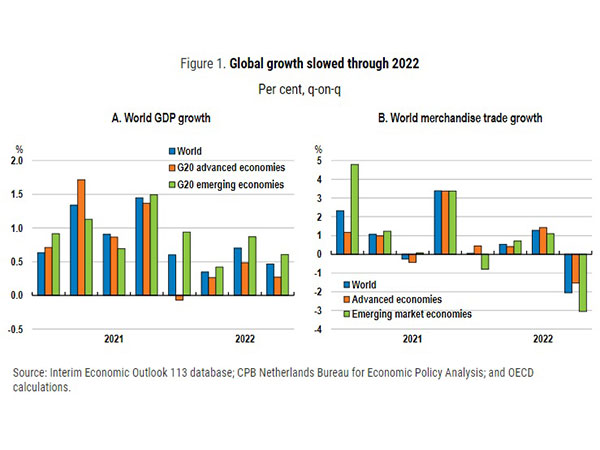Emerging-market economies in Asia are likely to be less affected by the global slowdown: OECD
A Fragile Recovery,' released on Friday.

- Country:
- France
The emerging-market economies in Asia are likely to be less affected by the global slowdown, helped by the rebound in China and more moderate inflation pressures, according to OECD Economic Outlook report. India's growth is projected to moderate to around 6 per cent in Financial Year (FY) 2023-24, amidst tighter financial conditions, before picking to recovering to around 7 per cent in FY 2024-25, while Indonesia's economy will continue to expand by between 4.7-5 per cent per annum over 2023-24, the OECD report said.
Growth in China is projected to rebound to 5.3 per cent this year, before easing to 4.9 per cent in 2024, according to the report -- 'OECD Economic Outlook, Interim Report March 2023: A Fragile Recovery.' The Organisation for Economic Cooperation and Development (OECD) in its report released on Friday, said the average annual growth of global GDP in 2023 is projected to be 2.6 per cent, recovering to 2.9 per cent in 2024, a rate close to the pre-pandemic trend. It was 2.2 per cent in its previous forecast in November.
It added that projected global growth over 2023-24 would be weaker than in any two-year period since the Global Financial Crisis, excluding the slump at the beginning of the pandemic. According to OECD report, growth in many other emerging-market economies, including Brazil and South Africa, is projected to be sluggish over the next two years, at about 1 per cent per year on average.
Activity in Turkiye is likely to be held back significantly in the early part of 2023 by the large losses from the recent earthquakes, but recover as reconstruction spending picks up, with full-year growth of 2.8 per cent in 2023 and 3.8 per cent in 2024. Output in Russia is expected to decline this year and next, as the drag from economic and financial sanctions starts to build, it added. Global growth is projected to remain at a below-trend rate in 2023-24, with inflation moderating gradually as the quick and synchronised monetary policy tightening over the past years takes full effect, according to the interim OECD report.
Lower commodity prices and the full reopening of China underpin a modest upward revision to the growth projections in 2023 from the OECD Economic Outlook in November 2022, but the growth benefits of these changes should be limited to the short term. OECD added demand is likely to be cushioned by further easing of household saving rates in many countries, with households yet to fully use the additional savings accumulated during the pandemic. The impact of tighter financial conditions is otherwise likely to be felt throughout the economy over time, particularly on private investment.
The OECD report said the disruption from the war in Ukraine is also likely to continue to weigh on global output both directly and indirectly through the impact on uncertainty, continuing risks to food and energy security and the significant changes taking place in commodity markets as price caps and Western embargos on Russian energy outputs take full effect. (ANI)
(This story has not been edited by Devdiscourse staff and is auto-generated from a syndicated feed.)
ALSO READ
South Africa's Tactical Triumph: Collapse in India's T20 Partnerships
South Africa Dominates India: A Turning Point in T20 World Cup
India's Batting Blueprint Exposed in Stunning T20 Loss
Khelo India Winter Games Spark Off with Spectacular Laser Show
Miller's Masterclass: South Africa's Triumph Over India in T20 Showdown










